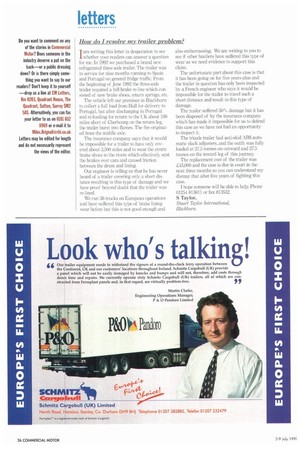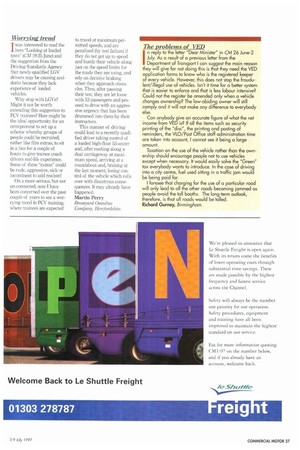How do I resolve my trailer problem?
Page 28

Page 29

If you've noticed an error in this article please click here to report it so we can fix it.
Jam writing this letter in desperation to see whether your readers can answer a question for me. In 1992 we purchased a brand new refrigerated three-axle trailer. The trailer was in service for nine months running to Spain and Portugal on general fridge traffic. From the beginning of June 1992 the three-axle trailer required a full brake re-line which consisted of new brake shoes, return springs, etc.
The vehicle left our premises in Blackburn to collect a full load from 111.111 for delivery to Portugal, but after discharging in Portugal and re-loading for return to the UK about 100 miles short of Cherbourg on the return leg, the trailer burst into flames. The fire originated from the middle axle.
The insurance company says that it would be impossible for a trailer to have only covered about 3,500 miles and to wear the centre brake shoes to the rivets which effectively sent the brakes over cam and caused friction between the drum and lining.
Our engineer is telling us that he has never heard of a trailer covering only a short distance resulting in this type of damage and we have proof beyond doubt that the trailer was re-lined.
We run 36 trucks on European operations and have suffered this type of brake lining wear before but this is not good enough and also embarrassing. We are writing to you to see if other hauliers have suffered this type of wear as we need evidence to support this claim.
The unfortunate part about this case is that it has been going on for five years-plus and the trailer in question has only been inspected by a French engineer who says it would be impossible for the trailer to travel such a short distance and result in this type of damage.
The trailer suffered 50% damage but it has been disposed of by the insurance company which has made it impossible for us to defend this case as we have not had an opportunity to inspect it.
The triaxle trailer had anti-skid ABS automatic slack adjusters, and the outfit was fully loaded at 37.5 tonnes on outward and 37.5 tonnes on the inward leg of this journey.
The replacement cost of the trailer was £45,000 and the case is due in court in the next three months so you can understand my dismay that after five years of fighting this case.
I hope someone will be able to help. Phone 01254 813611 or fax 813532.
S Taylor, Stuart Taylor International, Blackburn.
Worrying trend
Iwas interested to read the item "Looking at loaded tests" (CM 19-25 June) and the suggestion from the Driving Standards Agency that newly-qualified LGV drivers may be causing accidents because they lack experience of loaded vehicles.
Why stop with LGVs? Might it not be worth extending this suggestion to PCV trainees? Here might be the ideal opportunity for an entrepreneur to set up a scheme whereby groups of people could be recruited, rather like film extras, to sit in a bus for a couple of hours to give trainee coach drivers real-life experience. Some of these "extras" could be rude, aggressive, sick or incontinent to add realism!
On a more serious, but not un-connected, note I have been concerned over the past couple of years to see a worrying trend in PCV training, where trainees are expected to travel at maximum permitted speeds, and are penalised (by test failure) if they do not get up to speed and hustle their vehicle along just on the speed limits for the roads they are using, and rely on decisive braking when they approach obstacles. Then, after passing their test, they are let loose with 53 passengers and proceed to drive with an aggressive urgency that has been drummed into them by their instructors.
This manner of driving could lead to a recently qualified driver taking control of a loaded high-floor 53-seater and, after rushing along a dual carriageway at maximum speed, arriving at a roundabout and, braking at the last moment, losing control of the vehicle which rolls over with disastrous consequences. It may already have happened.
Martin Perry
Bromyard Omnibus Company, 1 krefordshire,








































































































